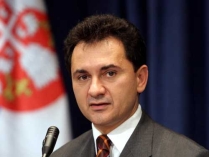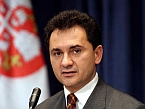Q:
A:
Serbia’s policy is Kosovo as well as Europe
Belgrade,
1 March 2008
Serbian Deputy Prime Minister Bozidar Djelic said in an interview for today’s edition of the daily Blic that the Serbian government’s aims are still unaltered – Serbia should acquire candidate status for EU membership by the end of 2008, removal of visa restrictions for Serbian citizens and that Serbia should become a candidate for EU structural funds.
Djelic said that the EU neither has the capacity to nor has it recognised the unilateral declaration of independence by Kosovo.
That was done by individual members of the EU. Serbia will never trade off Kosovo nor give up on its future and stability. That is why I emphasise that the government’s aims have not changed – getting candidate status by the end of 2008, removal of visa restrictions and becoming a candidate for EU structural funds, said Djelic.
According to Djelic, Serbia will never isolate itself, and it is in Serbia’s national interest to strengthen itself so that it can have the economic, diplomatic and security capacities to influence countries which have recognised Kosovo and to take new allies on board.
Only a policy like this can bear fruit. A policy of isolation is hopeless. That would only provoke reaction among those who are stronger and have violated international law. That is not the way to victory, said the Deputy Prime Minister.
Djelic said that Serbia will sign the Stabilisation and Association Agreement the moment this is proposed by the European Commission.
Serbia’s policy is Kosovo as well as Europe. We must think of the future of all our citizens. Those in Strpce,Subotica and Toronto. That is a responsible policy. Europe is divided on Kosovo-Metohija. Those who are advocating that Kosovo should remain within the borders of Serbia, like Romania, are indicating to us that the best way to defend ourselves is to continue the process of European integration, said Djelic.
He said that it is most important to preserve stability throughout Serbia, including Kosovo.
The manner in which the international community – UNMIK, which we recognise and EULEK, which we don’t recognise – will treat Serbs and all other non-Albanians who think of Kosovo as their home, will also be of great importance. Every violent attempt to create loyalty to Pristina where there is none would lead to new tensions and conflicts. This is why the international community bears a great responsibility, said Djelic.
According to Djelic, Russia has made it clear to Serbia that the gas pipeline project Southern Stream is a way of avoiding the insecurity of going through countries which are not in the EU, such as Ukraine.
It is also in Russia’s interest that Serbia joins the EU, said Djelic.
He stressed that the Russians have presented a strategic proposal and there was the option of building the Southern Stream through Serbia or Romania.
The decision to build it through Serbia, on the condition of the sale of the Serbian oil industry NIS, is of economic and geopolitical importance to Serbia. That is why I consider that the arrangement reached with the Russians is in Serbia’s interest, said Djelic.
He said that there is unity within the Serbian government that harmonising the Serbian economy with the EU system is in Serbia’s interest and will lead to a better living standard.
Contacts with the EU are very much a reality – on February 26 two meetings were held as part of the Enhanced Permanent Dialogue, next week we are to negotiate the removal of visa restrictions, and from March 10 to 14 European Commission rapporteurs will be here to assess the progress of reforms in the areas of judiciary, security and human rights. It should be known that the European Commission has sent us a financial agreement which will let us use funds up to €180 million this year alone, said Djelic.
He said that he initiated the formation of a national council for competition protection because we should not accept the fact that Serbia is in 91st place among 133 countries regarding competition.
We will work on all dimensions which are used in measuring competition – quality, human resources, improvement of the business environment, improving macroeconomic stability and the financial market, improvement in infrastructure and increased energy efficiency and the development of small and medium-sized enterprises. By the summer we will also have specific measures which will be financed, if necessary, by rebalancing the budget or through the 2009 budget. The aim is to climb the list by some 25 places during the next three years, explained Djelic.
That was done by individual members of the EU. Serbia will never trade off Kosovo nor give up on its future and stability. That is why I emphasise that the government’s aims have not changed – getting candidate status by the end of 2008, removal of visa restrictions and becoming a candidate for EU structural funds, said Djelic.
According to Djelic, Serbia will never isolate itself, and it is in Serbia’s national interest to strengthen itself so that it can have the economic, diplomatic and security capacities to influence countries which have recognised Kosovo and to take new allies on board.
Only a policy like this can bear fruit. A policy of isolation is hopeless. That would only provoke reaction among those who are stronger and have violated international law. That is not the way to victory, said the Deputy Prime Minister.
Djelic said that Serbia will sign the Stabilisation and Association Agreement the moment this is proposed by the European Commission.
Serbia’s policy is Kosovo as well as Europe. We must think of the future of all our citizens. Those in Strpce,Subotica and Toronto. That is a responsible policy. Europe is divided on Kosovo-Metohija. Those who are advocating that Kosovo should remain within the borders of Serbia, like Romania, are indicating to us that the best way to defend ourselves is to continue the process of European integration, said Djelic.
He said that it is most important to preserve stability throughout Serbia, including Kosovo.
The manner in which the international community – UNMIK, which we recognise and EULEK, which we don’t recognise – will treat Serbs and all other non-Albanians who think of Kosovo as their home, will also be of great importance. Every violent attempt to create loyalty to Pristina where there is none would lead to new tensions and conflicts. This is why the international community bears a great responsibility, said Djelic.
According to Djelic, Russia has made it clear to Serbia that the gas pipeline project Southern Stream is a way of avoiding the insecurity of going through countries which are not in the EU, such as Ukraine.
It is also in Russia’s interest that Serbia joins the EU, said Djelic.
He stressed that the Russians have presented a strategic proposal and there was the option of building the Southern Stream through Serbia or Romania.
The decision to build it through Serbia, on the condition of the sale of the Serbian oil industry NIS, is of economic and geopolitical importance to Serbia. That is why I consider that the arrangement reached with the Russians is in Serbia’s interest, said Djelic.
He said that there is unity within the Serbian government that harmonising the Serbian economy with the EU system is in Serbia’s interest and will lead to a better living standard.
Contacts with the EU are very much a reality – on February 26 two meetings were held as part of the Enhanced Permanent Dialogue, next week we are to negotiate the removal of visa restrictions, and from March 10 to 14 European Commission rapporteurs will be here to assess the progress of reforms in the areas of judiciary, security and human rights. It should be known that the European Commission has sent us a financial agreement which will let us use funds up to €180 million this year alone, said Djelic.
He said that he initiated the formation of a national council for competition protection because we should not accept the fact that Serbia is in 91st place among 133 countries regarding competition.
We will work on all dimensions which are used in measuring competition – quality, human resources, improvement of the business environment, improving macroeconomic stability and the financial market, improvement in infrastructure and increased energy efficiency and the development of small and medium-sized enterprises. By the summer we will also have specific measures which will be financed, if necessary, by rebalancing the budget or through the 2009 budget. The aim is to climb the list by some 25 places during the next three years, explained Djelic.











